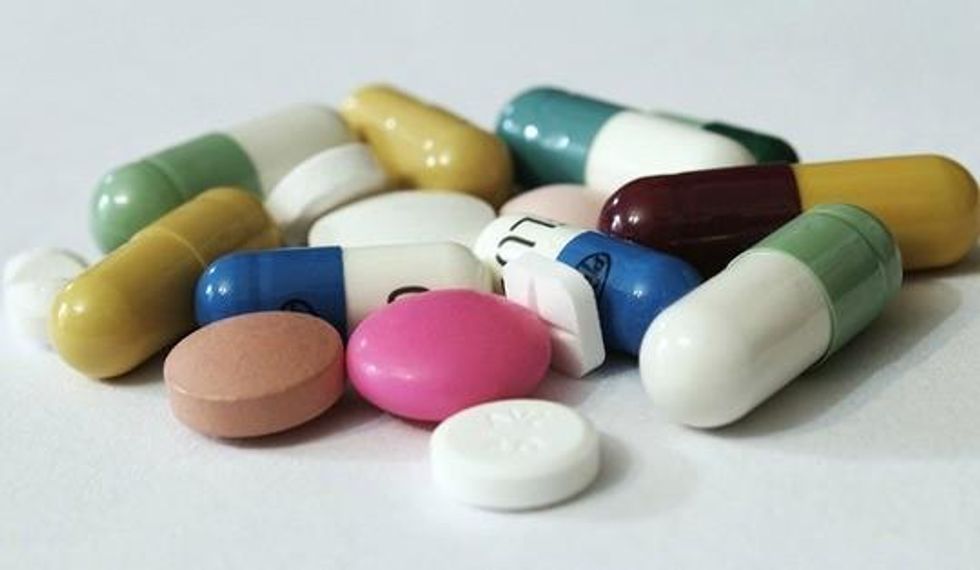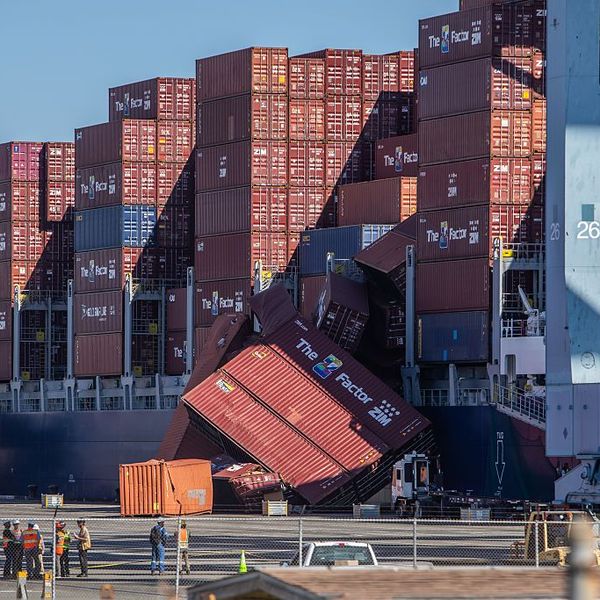Obama's Pacific Trade Deal 'Worst Ever' Attack on Public Health, Leaked Draft Shows
Wikileaks publishes draft chapter of closed-door negotiations as White House seeks to fast-track agreement

"The Obama administration's proposals are the worst - the most damaging for health - we have seen in a U.S. trade agreement to date," said Peter Maybarduk, director of Public Citizen's global access to medicines program. "The Obama administration has backtracked from even the modest health considerations adopted under the Bush administration."
A secret 94-page draft chapter on intellectual property negotiations, published by Wikileaks, provides a snap-shot of the secret 19th round of negotiations that took place in the country of Brunei in late August. While the TPP negotiations started in 2008 and the agreement is poised to be the largest U.S. trade deal ever, this is the first time the public has had access to any draft of this chapter.
Legal experts say the document reveals a U.S. effort to champion the demands of the pharmaceutical industry by pushing to reduce the ability of countries to invoke public health to override patents, even in cases where this would make life-saving medicines more affordable and accessible.
"The Obama administration's shameful bullying on behalf of the giant drug companies would lead to preventable suffering and death in Asia-Pacific countries," said Maybarduk. "And soon the administration is expected to propose additional TPP terms that would lock Americans into high prices for cancer drugs for years to come."
Experts also say the chapter shows an Obama administration taking aim at internet freedoms.
"The WikiLeaks text also features Hollywood and recording industry-inspired proposals - think about the SOPA debacle - to limit Internet freedom and access to educational materials, to force Internet providers to act as copyright enforcers and to cut off people's Internet access," said Burcu Kilic, an intellectual property lawyer with Public Citizen. "These proposals are deeply unpopular worldwide and have led to a negotiation stalemate."
"The longest section of the Chapter - 'Enforcement' - is devoted to detailing new policing measures, with far-reaching implications for individual rights, civil liberties, publishers, internet service providers and internet privacy, as well as for the creative, intellectual, biological and environmental commons," reads a statement released by Wikileaks.
The Obama administration has so far refused to release drafts of the negotiated text, and so far the bulk of public information about the deal comes from fragmented and limited leaks. Previous documents show negotiators are pushing to include NAFTA-like corporate tribunals that allow multinational companies to circumvent national legal systems and domestic protections of the environment and public health by settling with governments in secret courts.
The parties to the agreement--Australia, the US, Canada, Japan, Mexico, Peru, Vietnam, Malaysia, Brunei, Chile, New Zealand, and Singapore--collectively comprise nearly 40 percent of the world's GDP. Excluding China, the agreement appears to be in step with the U.S. military pivot to Asia in a bid to hedge against China's rising power.
The revelations come ahead of the TPP Chief Negotiators' summit in Salt Lake City, Utah later this month and in the midst of a White House bid to fast-track the agreement, details of which have been kept from both the U.S. public and elected lawmakers.
_____________________
An Urgent Message From Our Co-Founder
Dear Common Dreams reader, The U.S. is on a fast track to authoritarianism like nothing I've ever seen. Meanwhile, corporate news outlets are utterly capitulating to Trump, twisting their coverage to avoid drawing his ire while lining up to stuff cash in his pockets. That's why I believe that Common Dreams is doing the best and most consequential reporting that we've ever done. Our small but mighty team is a progressive reporting powerhouse, covering the news every day that the corporate media never will. Our mission has always been simple: To inform. To inspire. And to ignite change for the common good. Now here's the key piece that I want all our readers to understand: None of this would be possible without your financial support. That's not just some fundraising cliche. It's the absolute and literal truth. We don't accept corporate advertising and never will. We don't have a paywall because we don't think people should be blocked from critical news based on their ability to pay. Everything we do is funded by the donations of readers like you. Will you donate now to help power the nonprofit, independent reporting of Common Dreams? Thank you for being a vital member of our community. Together, we can keep independent journalism alive when it’s needed most. - Craig Brown, Co-founder |

"The Obama administration's proposals are the worst - the most damaging for health - we have seen in a U.S. trade agreement to date," said Peter Maybarduk, director of Public Citizen's global access to medicines program. "The Obama administration has backtracked from even the modest health considerations adopted under the Bush administration."
A secret 94-page draft chapter on intellectual property negotiations, published by Wikileaks, provides a snap-shot of the secret 19th round of negotiations that took place in the country of Brunei in late August. While the TPP negotiations started in 2008 and the agreement is poised to be the largest U.S. trade deal ever, this is the first time the public has had access to any draft of this chapter.
Legal experts say the document reveals a U.S. effort to champion the demands of the pharmaceutical industry by pushing to reduce the ability of countries to invoke public health to override patents, even in cases where this would make life-saving medicines more affordable and accessible.
"The Obama administration's shameful bullying on behalf of the giant drug companies would lead to preventable suffering and death in Asia-Pacific countries," said Maybarduk. "And soon the administration is expected to propose additional TPP terms that would lock Americans into high prices for cancer drugs for years to come."
Experts also say the chapter shows an Obama administration taking aim at internet freedoms.
"The WikiLeaks text also features Hollywood and recording industry-inspired proposals - think about the SOPA debacle - to limit Internet freedom and access to educational materials, to force Internet providers to act as copyright enforcers and to cut off people's Internet access," said Burcu Kilic, an intellectual property lawyer with Public Citizen. "These proposals are deeply unpopular worldwide and have led to a negotiation stalemate."
"The longest section of the Chapter - 'Enforcement' - is devoted to detailing new policing measures, with far-reaching implications for individual rights, civil liberties, publishers, internet service providers and internet privacy, as well as for the creative, intellectual, biological and environmental commons," reads a statement released by Wikileaks.
The Obama administration has so far refused to release drafts of the negotiated text, and so far the bulk of public information about the deal comes from fragmented and limited leaks. Previous documents show negotiators are pushing to include NAFTA-like corporate tribunals that allow multinational companies to circumvent national legal systems and domestic protections of the environment and public health by settling with governments in secret courts.
The parties to the agreement--Australia, the US, Canada, Japan, Mexico, Peru, Vietnam, Malaysia, Brunei, Chile, New Zealand, and Singapore--collectively comprise nearly 40 percent of the world's GDP. Excluding China, the agreement appears to be in step with the U.S. military pivot to Asia in a bid to hedge against China's rising power.
The revelations come ahead of the TPP Chief Negotiators' summit in Salt Lake City, Utah later this month and in the midst of a White House bid to fast-track the agreement, details of which have been kept from both the U.S. public and elected lawmakers.
_____________________

"The Obama administration's proposals are the worst - the most damaging for health - we have seen in a U.S. trade agreement to date," said Peter Maybarduk, director of Public Citizen's global access to medicines program. "The Obama administration has backtracked from even the modest health considerations adopted under the Bush administration."
A secret 94-page draft chapter on intellectual property negotiations, published by Wikileaks, provides a snap-shot of the secret 19th round of negotiations that took place in the country of Brunei in late August. While the TPP negotiations started in 2008 and the agreement is poised to be the largest U.S. trade deal ever, this is the first time the public has had access to any draft of this chapter.
Legal experts say the document reveals a U.S. effort to champion the demands of the pharmaceutical industry by pushing to reduce the ability of countries to invoke public health to override patents, even in cases where this would make life-saving medicines more affordable and accessible.
"The Obama administration's shameful bullying on behalf of the giant drug companies would lead to preventable suffering and death in Asia-Pacific countries," said Maybarduk. "And soon the administration is expected to propose additional TPP terms that would lock Americans into high prices for cancer drugs for years to come."
Experts also say the chapter shows an Obama administration taking aim at internet freedoms.
"The WikiLeaks text also features Hollywood and recording industry-inspired proposals - think about the SOPA debacle - to limit Internet freedom and access to educational materials, to force Internet providers to act as copyright enforcers and to cut off people's Internet access," said Burcu Kilic, an intellectual property lawyer with Public Citizen. "These proposals are deeply unpopular worldwide and have led to a negotiation stalemate."
"The longest section of the Chapter - 'Enforcement' - is devoted to detailing new policing measures, with far-reaching implications for individual rights, civil liberties, publishers, internet service providers and internet privacy, as well as for the creative, intellectual, biological and environmental commons," reads a statement released by Wikileaks.
The Obama administration has so far refused to release drafts of the negotiated text, and so far the bulk of public information about the deal comes from fragmented and limited leaks. Previous documents show negotiators are pushing to include NAFTA-like corporate tribunals that allow multinational companies to circumvent national legal systems and domestic protections of the environment and public health by settling with governments in secret courts.
The parties to the agreement--Australia, the US, Canada, Japan, Mexico, Peru, Vietnam, Malaysia, Brunei, Chile, New Zealand, and Singapore--collectively comprise nearly 40 percent of the world's GDP. Excluding China, the agreement appears to be in step with the U.S. military pivot to Asia in a bid to hedge against China's rising power.
The revelations come ahead of the TPP Chief Negotiators' summit in Salt Lake City, Utah later this month and in the midst of a White House bid to fast-track the agreement, details of which have been kept from both the U.S. public and elected lawmakers.
_____________________

